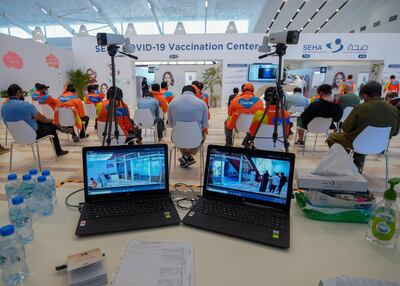Antibody tests could help determine whether people vaccinated against Covid-19 would require regular booster injections, doctors in the UAE said.
Boosters are an extra dose of a vaccine taken after the first inoculation. A tetanus booster, for example, is recommended for adults every 10 years to reactivate immune memory.
Doctors who spoke to The National said more research was needed to understand whether a vaccinated person's immunity to the Covid-19 virus weakened over time – an antibody test could help to shed light on the matter.
A blood sample is tested to check if a person's body has antibodies present to combat the virus.
Antibodies are proteins that help to fight off infections and can provide protection against getting that disease again.
"Some of the vaccines remain in our body for life – that's why we need only one dose when we take the childhood vaccine. When it comes to Covid-19, it's very new. We still don't know how long the cells' memory to kill the virus lasts," said Dr Anitha Varghese, general practitioner at Aster Jubilee Medical Centre in Dubai.
“If we’re taking a killed virus, like the Sinopharm vaccine, we have to check the antibodies after eight to nine months and then decide whether the booster dose is required or not.”
The UAE authorised use of the Sinopharm vaccine, which is available nationwide. In Dubai, the Pfizer-BioNTech vaccine is also available to prioritised groups.
More than 2.06 million doses of Covid-19 vaccine have been administered so far. The country aims to have at least 50 per cent of the population vaccinated by the end of March.

Two doses of the vaccine are needed to achieve immunity. The first one helps the body's plasma B-cells generate antibodies against the virus.
The second is taken after three to four weeks to boost immunity of the antibodies. This guides the body's T-cells, or memory cells, to find and kill the pathogen.
Dr Varghese said it was unknown how long T-cell memory endured to keep killing the Covid-19 virus in a person's body over time.
Moderna, an American pharmaceutical company, announced last week that it could be testing booster shots for its vaccine to be taken a year later.
This would be in addition to the two injections that people need now – a priming dose, followed by a booster after 28 days.
“From what we’ve seen so far, I think our expectation is that the vaccination should last you at least a year,” Moderna’s chief medical officer, Dr Tal Zaks, said last week during the JPMorgan Healthcare Conference, as reported by CNBC.
“To the degree that you need a booster shot, we’ll make a data-based recommendation, and that will require us getting the data.”
Dr Bobomurod Keldiyorov, a family medicine specialist at Canadian Specialist Hospital in Dubai, said other diseases required booster vaccinations. These include tetanus and hepatitis B.
“For tetanus, we do the booster dose every 10 years,” he said.
“For the Covid-19 vaccine, the body can produce enough antibodies initially, but after months or years, it [antibodies can go down and then, maybe, we need the booster dose.
“But the question is how long would it take for the booster dose to be required – after a few months or a year? We don’t know yet and scientists could help us answer that.”
Currently, antibody tests are available for walk-in patients in some Abu Dhabi hospitals and clinics at a cost ranging from Dh250 to Dh300.
Several private hospitals in Dubai told The National that the tests were not available for outpatients or walk-ins, even though they were easily accessible before the vaccine campaign started.
Dr Meenakshi Jain, a pathologist at Prime Medical Centre in Dubai, said the tests could soon be in demand.
“As far as I know, [hospitals in Dubai] are not doing antibody testing. We are still seeking approval from the government,” she said.
“I feel, if the vaccines are out now, there will be a demand by the healthcare provider for antibody tests, mainly for monitoring the response and even checking antibody levels to see if any further booster doses are required.”




























